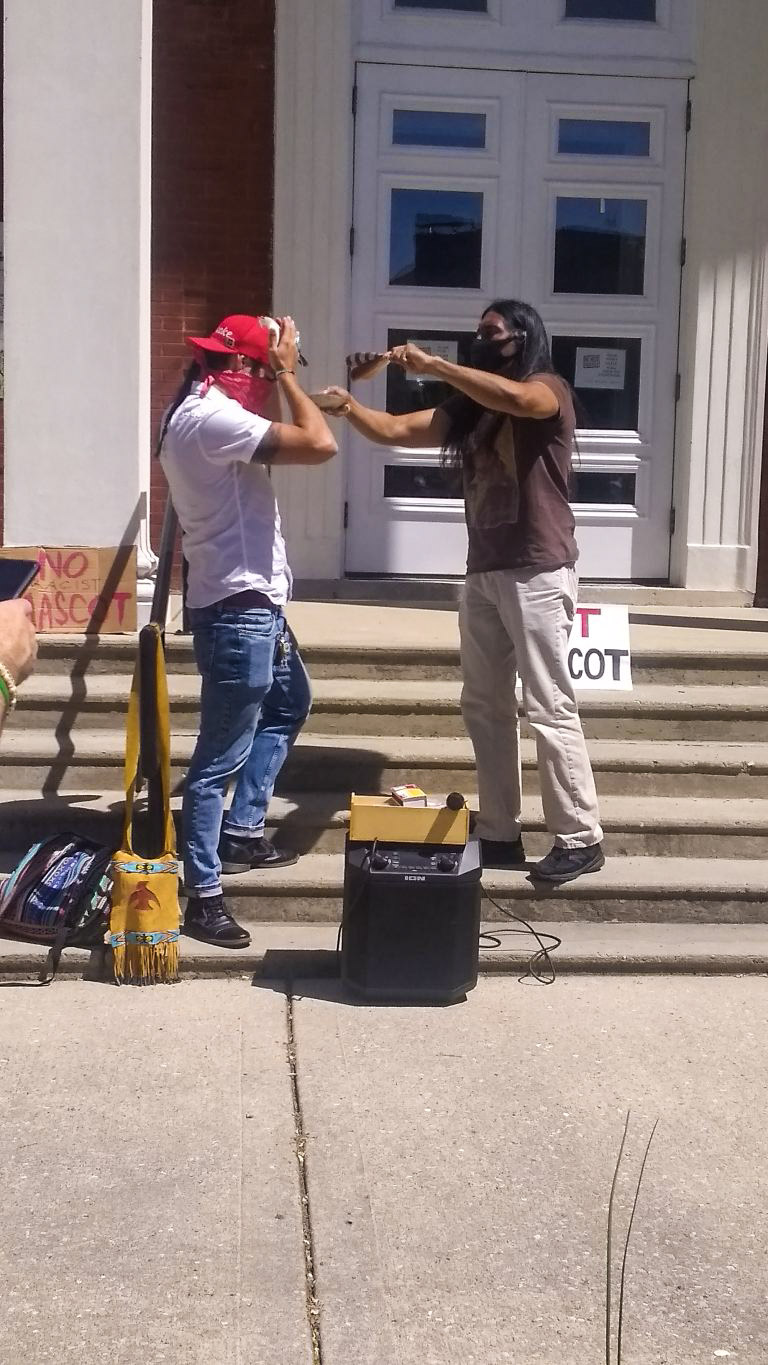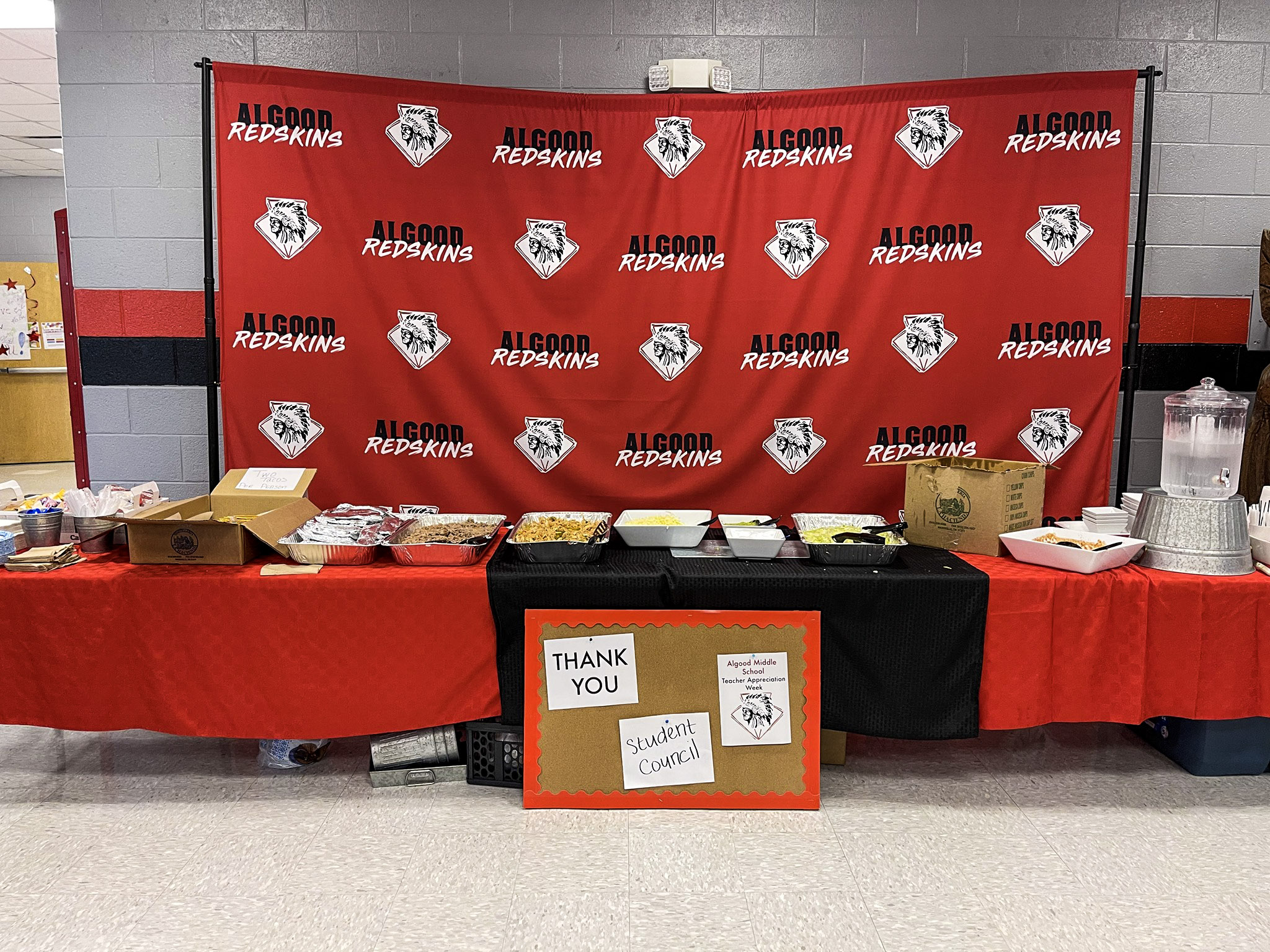Indianz.Com > News > People’s World: Native community protests use of racist mascots

The struggle against Native ‘mascots’ erupts in Tennessee town
Wednesday, May 19, 2021
People's World
COOKEVILLE, Tennessee — This small university town about 80 miles east of Nashville has joined the legion of other municipalities in the U.S. facing the issue of Native mascots used by school sports teams.
On a pleasant Saturday afternoon, May 1, several dozen demonstrators led by Chiricahua Apache and Sayota Knight marched from the campus of Tennessee Tech University to the Putnam County Courthouse to hold a rally demanding the removal of the mascot name “redskins” by local Algood Middle School from its football and other athletic teams.
On their way to the courthouse, the marchers chanted, “Hey, hey, ho ho, that racist mascot’s got to go,” “No hate in our state,” and “Change the name.”
Speaking against the mascot name, Knight and others, including Zeke Reedy of the Muscogee Creek Nation, pointed out that Native Americans for decades have been opposing the use of Indigenous sports mascots and names by U.S. schools and sports teams.
Knight, who lives in Cookeville with his wife and children, has been waging the anti-mascot campaign for two years. Algood Middle School has been using the mascot name “redskins” for years. The school also has a Native logo with a headdress on its website.
Across Tennessee, over 80 schools still have “Native American” sports mascots, logos, and symbols.
The Putnam County School Board, which oversees Algood Middle School had said last year that consideration would be given to the removal of the offensive mascot name. Subsequently, without notice to Knight, the Board had an unscheduled meeting in February and voted unanimously to keep the noxious name. The irrational reason of “honoring” Native people was put forth.
Corby King, the Director of Schools for Putnam County, with whom Knight had been in contact, did not return a message asking for comment. But, the Board’s Communications Supervisor, Hanna Davis, speaking in his stead, did contact this reporter and advised that there were no plans to give further consideration to the issue. Davis said that all of the Board members had received numerous phone calls from parents expressing opposition to a name change.


Use of the symbols called “harmful”
In a resolution passed by the NCAI in 2005, the organization stated, “The use of Native American sports mascots, logos or symbols perpetuates stereotypes of American Indians that are very harmful.” The resolution continued, “Research has shown that the continued use of American Indian mascots, symbols, images, and personalities has a negative effect on not only American Indian students but all students.”
The term “redskin” originated with the practice of white settlers who, after killing Indigenous people, would cut strips of skin from their bodies to be used for razor straps and horse bridles. It entered the lexicon of the English language on a widespread basis in the early 19th Century and also referred to the red scalp or other body parts collected for monetary bounty.
In parts of California in the middle 19th century, bounties were paid by municipalities for Native heads. The local white settlers were more than obliging by bringing in heads by the sack load for payment by town officials. In 1856, the state of California paid 25 cents for each Native scalp, no exceptions made for any Indigenous man, woman, child, infant, or elder who fell into the clutches of these murderous settler militia companies. This was genocide for pay.
These inhuman, barbaric practices were lauded by the townsfolk, and yet the Euro-Americans had the audacity to call Native people “uncivilized.”
In Cookeville, there have been attacks by racist forces. Knight reported that his mailbox had been turned over, garbage thrown on his lawn, and rocks thrown at his house. But he has vowed to continue the struggle for the removal of the racist mascot names.
Albert Bender is a Cherokee activist, historian, political columnist, and freelance reporter for Native and Non-Native publications. He was an organizer and delegate to the First and Second Intercontinental Indian Conferences held in Quito, Ecuador and Quetzaltenango, Guatemala. Recently, he has been an active participant and reporter in the Standing Rock struggle in North Dakota. He is an attorney and is currently writing a legal treatise on Native American sovereignty. He is also writing a book on the war crimes committed by the U.S. against the Maya people in the Guatemalan civil war of the late 20th century. He is also the recipient of several Eagle Awards by the Tennessee Native American Eagle Organization and a former Director of Native American Legal Departments and a Tribal Public Defender.
This article originally appeared on People's World. It is published under a Creative Commons license.
Search
Filed Under
Tags
More Headlines
Native America Calling: Tribes ponder blood quantum alternative
Defense bill snubs Indian Country in favor of Lumbee federal recognition
NAFOA: 5 Things You Need to Know this Week (December 8, 2025)
Chuck Hoskin: Cherokee Nation benefits from extension of health care credits
Native America Calling: Tribal museums reflect on tumultuous year, chart their next steps
Press Release: National Museum of the American Indian hosts Native art market
AUDIO: Sea Lion Predation in the Pacific Northwest
Native America Calling: Tribal colleges see an uncertain federal funding road ahead
Native America Calling: Short films taking on big stories
Native America Calling: Advocates push back against new obstacles to Missing and Murdered Indigenous Relatives momentum
Native America Calling: For all its promise, AI is a potential threat to culture
NAFOA: 5 Things You Need to Know this Week (November 24, 2025)
Chuck Hoskin: Cherokee Nation invests in rural transportation
Native America Calling: Native candidates make strides in local elections
National Congress of American Indians returns incumbents and welcomes newcomers to leadership
More Headlines
Defense bill snubs Indian Country in favor of Lumbee federal recognition
NAFOA: 5 Things You Need to Know this Week (December 8, 2025)
Chuck Hoskin: Cherokee Nation benefits from extension of health care credits
Native America Calling: Tribal museums reflect on tumultuous year, chart their next steps
Press Release: National Museum of the American Indian hosts Native art market
AUDIO: Sea Lion Predation in the Pacific Northwest
Native America Calling: Tribal colleges see an uncertain federal funding road ahead
Native America Calling: Short films taking on big stories
Native America Calling: Advocates push back against new obstacles to Missing and Murdered Indigenous Relatives momentum
Native America Calling: For all its promise, AI is a potential threat to culture
NAFOA: 5 Things You Need to Know this Week (November 24, 2025)
Chuck Hoskin: Cherokee Nation invests in rural transportation
Native America Calling: Native candidates make strides in local elections
National Congress of American Indians returns incumbents and welcomes newcomers to leadership
More Headlines